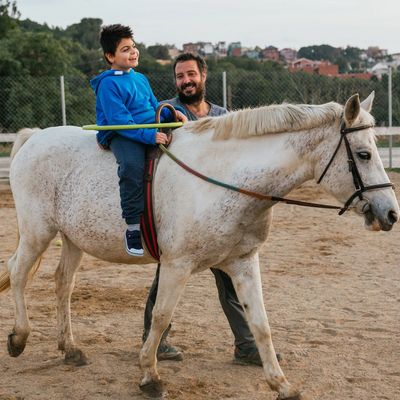Equine Therapy

What is it?
Equine therapy, also known as equine-assisted therapy or equitherapy, offers a unique, holistic approach to physical and emotional development. The practice leverages the bond between horse and rider to foster self-confidence, enhance balance, and improve motor skills in ways that are particularly beneficial to individuals with a range of physical and cognitive challenges. The structured activities and natural rhythm of horseback riding have proven therapeutic effects, allowing students to experience a sense of empowerment and independence.
Numerous studies underscore the physical, cognitive, and emotional benefits of equine-assisted therapy. For example, research published in Frontiers in Psychology highlights that equine therapy can improve motor function, communication skills, and social interaction in individuals with developmental and neurological conditions. A 2016 study in the Journal of Alternative and Complementary Medicine found that equine therapy significantly increased physical strength and self-esteem in children with disabilities. Additionally, organizations like the Mayo Clinic acknowledge equine therapy’s effectiveness in promoting relaxation, reducing stress, and building resilience, making it a respected form of complementary therapy.
Physical Benefits
Posture - Horseback riding helps visually impaired individuals improve posture by guiding head and shoulder alignment, which is often compromised by visual impairment.
Body Language - Improved posture through riding positively influences body language, helping visually impaired individuals present themselves confidently and correctly to sighted individuals.
Balance - Riding exercises enhance posture and balance by requiring riders to sit tall and engage their core, developing strength and spatial awareness.
Walking Gait - Horseback riding mimics the natural walking motion, helping visually impaired children improve stride, posture, and stability.
Body Awareness - Riding encourages alignment and body awareness, helping visually impaired individuals walk straighter with a more natural gait.
Motor Skills - Grooming and tacking up a horse develop fine and gross motor skills and teach focus, coordination, and independence.
Navigational Skills - Riding lessons enhance navigational abilities through spatial mapping, sound cues, and interactive games, making it a fun, educational experience.
Emotional Benefits
Self-Confidence - Building skills and bonding with horses empower individuals, fostering a sense of self-worth and achievement.
Reduced Anxiety and Stress - The calm, rhythmic motion of riding and the presence of horses can naturally reduce anxiety and promote relaxation.
Emotional Awareness - Description: Horses mirror human emotions, helping individuals recognize and regulate their feelings in a supportive environment.
Social Skills - Interaction with horses and therapy instructors enhances communication and fosters patience, which strengthens social connections.
Empathy and Connection - Description: Bonding with a horse nurtures empathy, as participants learn to care for and connect with another living being in a unique, non-judgmental way.
Mood and Emotional Balance - Physical activity and animal interaction can elevate serotonin levels, improving mood and stabilizing emotional responses.
Resilience and Coping Skills - Facing challenges in equine therapy helps individuals develop resilience and strengthens their ability to manage emotions in difficult situations.
Phycological Benefits
Improved Focus and Attention - Working with horses requires concentration and mindfulness, enhancing focus and attention over time.
Enhanced Problem-Solving Skills - Therapy activities encourage participants to think critically, solve problems, and adapt, skills that are valuable in daily life.
Reduced Symptoms of Depression - Equine therapy can help alleviate depressive symptoms by fostering a sense of purpose, engagement, and accomplishment.
Boosted Self-Efficacy - Successfully managing tasks, like grooming or steering the horse, strengthens belief in one’s abilities and sense of control.
Cognitive Flexibility - Adapting to the horse’s movements and behavior enhances mental flexibility and adaptability.
Increased Sense of Purpose - Regular sessions provide routine, responsibility, and a sense of purpose, which are psychologically beneficial, especially for those feeling disconnected or unmotivated.
Strengthened Mind-Body Connection - Riding requires awareness of body movements and positioning, which enhances mental engagement and connection with physical sensations.
Copyright © 2024 Freedom Footsteps - All Rights Reserved.
25785 Boerne Stage Rd, Boerne, TX 78006
This website uses cookies.
We use cookies to analyze website traffic and optimize your website experience. By accepting our use of cookies, your data will be aggregated with all other user data.